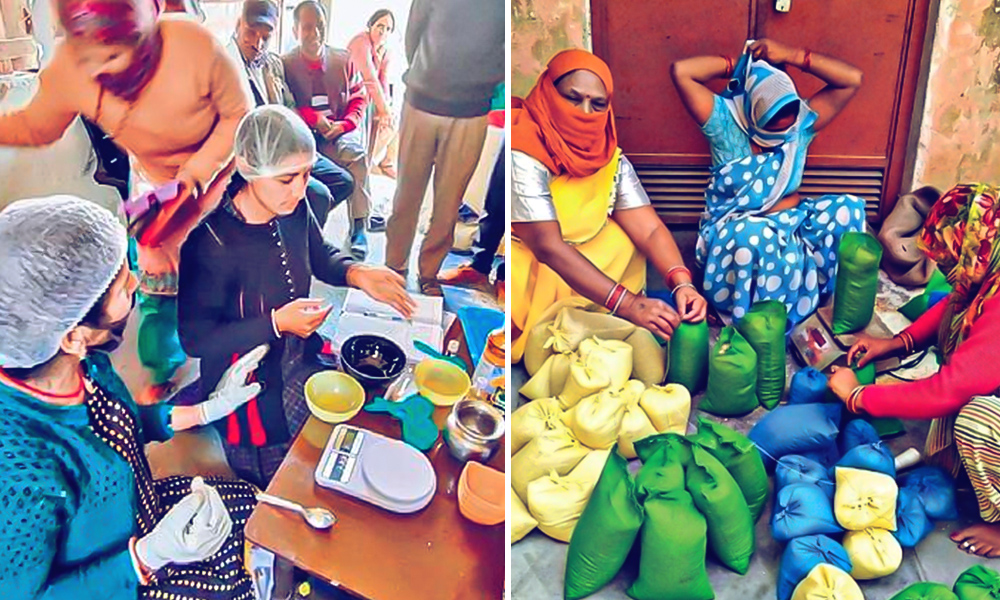
Image Credits: The New Indian Express, The New Indian Express
Fighting Malnutrition: UP Govt To Engage 68,000 Women Self Help Groups To Implement Take Home Ration Scheme
Writer: Palak Agrawal
Palak a journalism graduate believes in simplifying the complicated and writing about the extraordinary lives of ordinary people. She calls herself a " hodophile" or in layman words- a person who loves to travel.
Uttar Pradesh, 15 March 2021 1:32 PM GMT | Updated 19 March 2021 10:34 AM GMT
Editor : Shubhendu Deshmukh |
Shubhendu, the quint essential news junky, the man who loves science and politics in equal measure and offers the complete contrast to it by being a fan of urdu poetry as well.
Creatives : Rajath
A free spirit who find meaning in life with the virtue of creativity and doing job par its excellence, animal lover and traveller by heart.
Previously, private players were tasked with running the scheme in the villages and blocks. However, the authorities decided to change the structure after the beneficiaries complained about the quality and quantity of ration.
The Yogi Adityanath-led Uttar Pradesh government will engage 68,000 women self-help groups (SGHs) to ensure the state's Take Home Ration scheme is carried out efficiently. This would offer employment opportunities to the women besides providing ration to the beneficiaries.
Previously, private players were tasked with running the scheme in the villages and blocks. However, the authorities decided to change the structure after the beneficiaries complained about the quality and quantity of ration.
"Under the scheme, cooked food with specific caloric value is also provided to newborn babies, expecting and lactating mothers, children under the age of six years and other malnourished population," said Yogesh Kumar, in charge of Uttar Pradesh State Rural Livelihood Mission (UPSRLM), reported The New Indian Express.
Kumar specified that with the involvement of several participants, there were frequent complaints on procurement, delivery, quality and quantity of the food items. The beneficiaries, on numerous occasions, failed to get a timely nutritious portion.
To tackle this, he said, a simple formula has been worked out. "The state government has roped in around 3,000 SHG members, organised into 204 SHG Micro Enterprises (MEs) in 204 blocks of 18 districts and are entrusted to distribute prepared recipes with counted calories to beneficiaries."
Another 65,000 such groups have been roped in to procure and distribute ration. They will be obtaining dry ration at the village level and supply it to around 1.5 lakh Anganwadi centres. The ration will be procured locally and delivered locally.
"Roughly, one self-help group is able to distribute the Take Home Ration to two to three Anganwadi centres that have around 80-100 beneficiaries. So, overall, through this initiative, the Uttar Pradesh Government is being able to cover approximately 1.6 crore people. Basically, all the villages and blocks in the state have these self-help women groups who are employed by the government and they are now ensuring that the village people get the basic nutrition in the right amount and quality," Sujeet Kumar, Mission Director, UPSRLM told NDTV.
He said that earlier, the scheme was being carried out by the Integrated Child Development Services (ICDS) department which works to improve healthcare, nutrition and education for children under six years of age and their mothers.
For procuring the ration, funds were sent to a centralised vendor who would give it to the Anganwadi centres. Now, the money is directly transferred to these group members. The women procure food, pack it and deliver it to the beneficiaries.
Each group member would be able to earn a livelihood through the preparation and supply of the ration. Each woman of the SHG Micro Enterprise is expected to generate an additional income of ₹4,800-₹ 6,000 per month through preparations of specific caloric values of ration and its supply. Reports have pointed out that the members are able to save ₹10,000-12,000 per month which they take home as profits.
Besides fixing accountability, the process also guarantees that the beneficiaries, who need the ration the most, get access to it. Since the women groups know the neighbourhood and are aware of the residents, it ensures smooth delivery of the ration.
Moreover, the state doesn't need to carry out specific audits to check the proper functioning of the ration distribution system.
"I am part of the self-help-group in my village, I am working as well as the beneficiary of the Take Home Ration scheme. Earlier, the food we used to get was of very low quality, plus the quantity was very less. Since the time the government has roped us in the procurement and distribution of the ration, both these problems have been resolved. Many times, the food also used to get infested by insects as the ration used to stay at filthy godowns. However, since we have taken over the task, we ensure the good quality of the food to reduce the burden of malnutrition in children of our block," said Anu Devi, who is from the self-help group 'Jai Maa Kali', from Mahila Gram Sanghathan.
She further added that they share a bond of trust with the villagers which allows them to spot and solve ground-level issues.
To tackle malnutrition, the women self-help group are also tasked with the responsibility to educate women about breastfeeding practises diet for the newborns and motivating them to take care of their health.
Take Home Ration Scheme
Take Home Ration, a part of the Supplementary Nutrition Programme (SNP) under the ICDS, caters to children under six years of age and pregnant and lactating women to improve their health and nutritional status.
Under the scheme, the ration consisting of staple food such as rice, pulses, wheat, and oil is given to the beneficiaries for consumption at home.
 All section
All section














